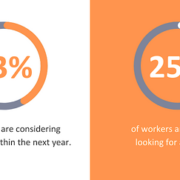Happiness at work: a key ingredient for productivity, creativity, and overall organisational success
In the month when we celebrated International Happiness at Work (23 – 27 September), we consider the rationale behind prioritising ’employee happiness’ and suggest actions employers can take to bring it to life in their workplaces.
Why is happiness at work important?
Research has shown that employees who are happy and feel a sense of wellbeing at work tend to be more productive, take fewer sick days, and contribute to a more positive and collaborative work environment. One such piece of research by Oxford University Saïd Business School found a conclusive link between happiness and productivity. In their research of call centre staff, they found that happy employees not only worked faster, making more calls per hour, but also achieved 13% higher sales than their unhappy colleagues. The CIPD and the Harvard Business Review agree and also point to the link between staff happiness and retention and engagement.
The call to action
Acknowledging the importance of happiness at work on its own is not enough. Employers need to take actionable steps to create a more positive and fulfilling working environment. Here are some ways your organisation can make happiness a priority:
- Organise Wellbeing Workshops: Host sessions focused on mindfulness, stress management, and work-life balance. Providing employees with tools and techniques to manage their wellbeing can make a significant difference in their daily work experience.
- Encourage Open Communication: Create an open forum where employees can share their thoughts and suggestions on how to improve their working environment. You might use online engagement tools, suggestions boxes or just talk to your staff. Whichever mechanisms you choose, listening to and importantly, acting on employee feedback can enhance their sense of belonging and satisfaction.
- Recognise and Celebrate Achievements: Recognise and celebrate the achievements of your team members. You might use formal awards, shout-outs, or simple in-person acknowledgments – celebrating success fosters a positive and motivated atmosphere.
- Promote Work-Life Balance: As remote and hybrid work models become more prevalent, it’s easier than ever for the lines between work and home life to become blurred. Promote flexible working arrangements or opportunities for additional time off. Encourage positive working practices at all levels to set boundaries, enabling staff to switch off after work hours. Supporting employees in achieving a better work-life balance can reduce burnout and increase overall happiness.
- Foster Team Building: Team relationships play a crucial role in creating a happy, productive workforce. Whatever team-building activities you plan, make sure they are both enjoyable and inclusive. Building strong relationships can create a more collaborative, innovative and supportive team. Strong team bonds can also lead to lower employee turnover.
- Offer Wellness Initiatives: Consider introducing wellness programmes such as fitness challenges, healthy eating options, or mental health resources. Investing in employee wellbeing demonstrates a commitment to happiness and health.
While International Week of Happiness at Work shines a spotlight on employee wellbeing, creating a culture of happiness and support should be an ongoing effort. Use it as an opportunity to reassess your organisation’s approach to employee happiness and consider if there are ways you can enhance that offering, to embed a culture of joy and wellbeing into the fabric of your organisation. By focusing on wellbeing initiatives, open communication, work-life balance, team building and recognition, you can create a culture where employees feel happy, valued, and motivated to succeed, for themselves and for your organisation.











